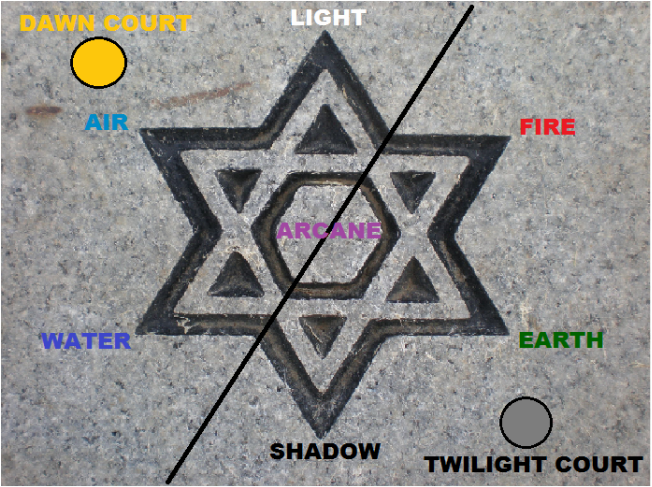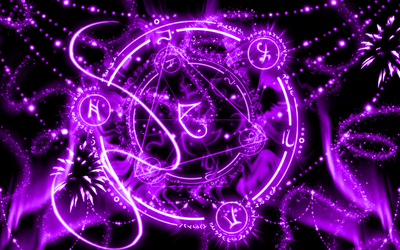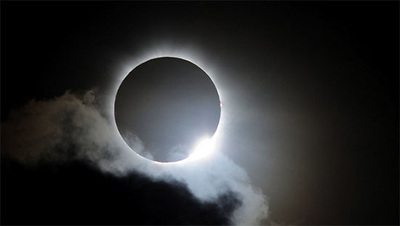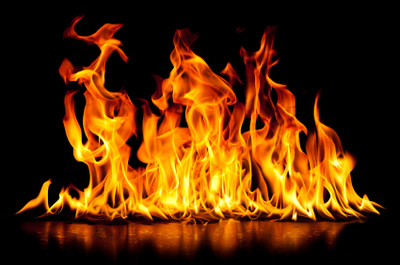The old witch stood by the beacon light at the very top of the Council’s tower and listened to the shrill wind. Behind her the raven loft was filled with clacks and chatter, but it was carried away by the gale.
Thin arms clutched a ragged dark grey robe around her shrunken frame. The temperature had dropped. A storm was on the way. The old woman sniffed the Air, feeling the element speak to her, fleeting and mercurial- telling her all that she needed to know about the storm heads forming above. The stones of the tower spoke to the heart of her being what Earth needed to tell her; the Grim Hill was reacting to the storm. Momentous things always transpired when the Hill began to stir…
Thunder rumbled and lightning flashed. The downpour began in earnest. The old woman stuck a small pink tongue between her cracked lips and tasted the news Water wanted to impart from the moisture collected all the way from the distant sea.
A wasted tree further down the slope was struck by lightning and the blackened trunk was wreathed in flames. Eyes squinting, the witch watched the flames leap and cavort. Fire’s dance told her much but always kept something back. Capricious- that was Fire’s way…
Satisfied, the old woman turned and nodded to the four guardians that had been respectfully keeping their distance. They resumed their vigil, unconcerned by the atrocious weather.
Joints creaking, the old woman descended the spiral stairs to her quarters. There she would consider all that she had learnt, consult her magical books and commune with more of her kind. As one of the most powerful arcane practitioners in the whole of the Vale, and a key member of the Witch’s Council, she felt the weight of responsibility weigh heavy on her stooped shoulders suddenly.
The elements had spoken. She had heard. Warnings needed to be given. Great magics and greater deeds would need to be done…
MAGIC
Magic is a fun way to get into the fantasy aspect of any game. Those who wish to learn the art of spells and abilities must be the appropriate level and class to do so. Not all classes can do all types of Magic. Before your character can use any of the elemental magic's, your character must first specialize in the element they want to learn. It is extremely important to write this into your characters story and we advise learning skills in the game from other characters once you pick your magic skills. If none of your friend’s characters have the ability you are looking to learn, NPC's (None Player Characters) can teach your character things in game. This helps connect the stories and characters.
Magic is used via spell orbs, weapon channelling, or touch / area of effect. Characters who wish to perform magic must be able to do so via our playbook rule-set. It is important to check your race and class abilities before applying for spells, as most classes are limited to a specific spell list. If you want to see what types of magic each class is allowed to do, please refer to the list below. Elders are ultimately responsible for the final decision on achievements used at Darken Vale.
How Spells Work
A spell is cast by holding a spell orb in your hand and charging it with an incantation that includes the spell's name. Once charged, the caster must then use the spell in the appropriate manner (touch, ranged, or weapon channelling). The effect takes place immediately after casting. The caster must then remove or hide one or more mana bands (depending on the spell's requirements) from their belt/wrist to show that it was used to cast the spell. All Magic casters MUST carry with them a spell book with their spells learned written inside. A description of the spells effect and their Spell Script.
Spell Scripts
Each spell cast via an incantation must follow the same formula. 1 line of script per level of spell, Spell name must be called out during incantation. This means that the greatest spells will take longer to cast.
Example Level 1 Earth Spell Root.
“By the power of the Earth, I ROOT you to the spot!”
Example Level 4 Air Spell Tempest:
"By the power of the Air,
That blows the storms in from the sea,
Bring forth your Fury and
Unleash a TEMPEST upon mine enemies!"
Every caster can create their own spell scripts for their spells, but these must be written in their carried spell books AND must follow the incantation formula.
Some spells can be blocked with a shield, others cannot. These spells are powerful enough to penetrate armour and will travel like lightning through any object the victim holds. This means if an un-blockable spell hits a shield or weapon the effect still takes place. While un-blockable spells are of much higher cost, they also may require a spell caster to be of a certain level before it can be performed. If the spell is blockable and hits armour, the armour will protect the target from the spell, but the spell will damage the armour. To counter an un-blockable spell, a character must have spell block which will absorb the magic being cast and negate it.
Powerful magic may also require the spell caster to use more mana bands or even sacrifice their own lives for something ultra-powerful. The bottom line is a spell caster will not have infinite casting ability. In retrospect, the magic in Darken Vale is powerful so while a caster is limited to how often spells are cast, they will be spells that pack lots of power! If a caster accidentally grabs a wrong coloured spell orb for a spell, the spell is not counted.
Spell Orbs
A spell orb is a small ball that is between 3” to 5” in diameter (if round) that is thrown by the spell caster. An orb is to weigh no more than 3oz. Spell orbs cannot have hard objects attached to them (such as jewels) or be bound with sharp objects (such as sharp metal wire). Everything used in a spell orb must be safe to be struck with. Players must use solid coloured spell orb that represents the elemental magic being used (see description of elements below). To signify ownership, a player must write their character name on each orb. You can colour the packet with designs to make it easier to identify, but at least 75% of the orbs colour must be that of the element it represents. Casters are responsible for their orbs at all times. Orbs found in the realm at the end of a game by elders will result in that caster losing XP on their profile. A spell orb is considered litter to everyone else.
Mana Bands
Spell casters are allowed to perform magic at will as long as they have the proper skills for that ability. Limits to the frequency of magic are shown with pure blue coloured Mana Bands placed on the right hip belt or right wrist which must be visible to all players. The caster is allowed to perform the amount of magical effects directly related to how many Mana Bands they have on. When they have used all the magic allocated by the bands, they must seek mana potions, etc. or rest without movement (meditate with incantations) in order to regain abilities. If your character dies, mana is not instantly replenished. You must act out meditation or use mana potions, enchantments, etc. to regain mana power.
Mana Bands allow players to self-police each other while staying in character. Plain and simple: Magic is powerful and can win battles, but it all has a price and it was designed to not overrule the game. Each character must have the skill sets on their character profile in order to carry them (proof of learning the skill). Mana Bands can NOT be traded and must stay on your character through the entire event. Bands should be on your belt or torso in clear view for all to see. If you stash mana bands, you cannot use them. If your arms are not sleeved, you may use your wrists to wear mana bands but when used, you must take them off. Most people prefer to keep them on their belt and just tuck them inside their belt to be out of view and easily trackable.
Wearing Armour and Mana Bands
If you take armour on or off during a game and still use mana, you must be sure your mana is on the outer most layer of our costume. Most who wear armour will put their bands on a quick release clasp of some sort so they can easily move their mana location from their armour (tasset leather is a popular place as is torso clips). If the armour is taken off, be sure to clip the mana back onto your belt.
Regeneration of Mana (Mana Bands) - Has a base of 1 mana per 10 minutes of meditation without any other skill needed. There are professions that can replenish mana as well.
Mana Band Skill Levels
As mentioned earlier, mana bands must be 100% blue in colour for easy identification. Casters need to submit the skill to learn how to carry each band (see class for level requirements). For example, if you are a caster and wanted to have 5 bands, you would have to have the skill to hold 4 bands before learning how to hold the 5th.
The amount of mana a character can have will directly relate to their race and class. If you do not see the skill listed in your class, then that class can't learn said skill.
Weapon Channelling
A spell caster can channel a magic attack through a weapon held in their hand (see ability description below) when environmental conditions make spell orbs hazardous (darkness, strong winds, etc.) to toss. The caster can use a melee weapon to deliver a spell rather than damage when this ability is active.
This system was put into place so casters can safely deal magic without losing spell orbs due to darkness, safety or chance of losing a spell orb. It is highly recommended that a caster does not toss spell orbs at night as they are more likely to be lost. Using weapon channelling instead, will keep things safe but still allow the fun of magic. The caster still must say the incantation before the blow hits a target.
Casters cannot bind magic to ranged weapons, arrows etc. The weapon must stay in the hands of the caster in order for this to work.
What it does: Allows caster to channel ranged magic through their weapon so a spell orb does not need to be used (This is to prevent the loss of spell orbs). If any spell that cancels magical effects is cast on or hits the player or NPC that is carrying an enchanted weapon, the weapon will no longer be enchanted. Uses no additional mana per cast, only whatever the spell cast cost is. The weapon is used to deliver the magic, not a physical blow. This means if you use a weapon to strike someone with magic, it will not deliver the magic AND the weapon attack, only the magic attack.
Spell Damage
Damage caused by spells is considered a local hit. Armour in our system has a global count system but armour does not work if the spell hits an unarmoured section of a target. Magic armours like Magic Shield, will protect the caster no matter where you hit them (but they usually don't' last long and can't be repaired). So, if a caster hits a target that is unarmoured with a "lesser" fire damage (that is simply a blockable 1 damage fire spell) the target would take a mortal wound to the torso. To do the same kind of damage to that same target but wearing torso armour, the caster would have to have a "greater" (un-blockable) version of that spell which would go through the armour. Then there is the most powerful spell which is ___ Death (the blank is filled in with the element orb colour so for this instance let us say it is "Fire Death or Death of Fire". In this instance, the target takes 5 points of health damage which would kill instantly most no matter where they are hit.
Spell Knowledge
Remember spell casters, it is not likely that your target will know what to do if they have never been hit by the spell you are casting. Be ready to quickly explain what you are casting and what they must do or what damage they must take.
Engaged Defined
“Engaged” means to occupy the attention or efforts of (a person or persons) by means of attacking them. If the character is actively in battle, or conflict by being physically attacked, or attacked with a spell they are considered "engaged". Being engaged also means being physically attacked with a ranged or melee weapon, charged at with the intent to attack, or physically attacked with a spell orb.
The Elements of Magic
The Magic of Darken vale is simple to learn yet effective and expansive. There are seven different element/spheres used in our system: Arcane, Earth, Air, Fire, Water, Light and Shadow. Each element is represented by a colour, as shown below:
Fire = Red
Water = Royal Blue
Earth = Green
Air = Light Blue
Light = White
Shadow = Black
Arcane = Purple
The Magic Matrix
Thin arms clutched a ragged dark grey robe around her shrunken frame. The temperature had dropped. A storm was on the way. The old woman sniffed the Air, feeling the element speak to her, fleeting and mercurial- telling her all that she needed to know about the storm heads forming above. The stones of the tower spoke to the heart of her being what Earth needed to tell her; the Grim Hill was reacting to the storm. Momentous things always transpired when the Hill began to stir…
Thunder rumbled and lightning flashed. The downpour began in earnest. The old woman stuck a small pink tongue between her cracked lips and tasted the news Water wanted to impart from the moisture collected all the way from the distant sea.
A wasted tree further down the slope was struck by lightning and the blackened trunk was wreathed in flames. Eyes squinting, the witch watched the flames leap and cavort. Fire’s dance told her much but always kept something back. Capricious- that was Fire’s way…
Satisfied, the old woman turned and nodded to the four guardians that had been respectfully keeping their distance. They resumed their vigil, unconcerned by the atrocious weather.
Joints creaking, the old woman descended the spiral stairs to her quarters. There she would consider all that she had learnt, consult her magical books and commune with more of her kind. As one of the most powerful arcane practitioners in the whole of the Vale, and a key member of the Witch’s Council, she felt the weight of responsibility weigh heavy on her stooped shoulders suddenly.
The elements had spoken. She had heard. Warnings needed to be given. Great magics and greater deeds would need to be done…
MAGIC
Magic is a fun way to get into the fantasy aspect of any game. Those who wish to learn the art of spells and abilities must be the appropriate level and class to do so. Not all classes can do all types of Magic. Before your character can use any of the elemental magic's, your character must first specialize in the element they want to learn. It is extremely important to write this into your characters story and we advise learning skills in the game from other characters once you pick your magic skills. If none of your friend’s characters have the ability you are looking to learn, NPC's (None Player Characters) can teach your character things in game. This helps connect the stories and characters.
Magic is used via spell orbs, weapon channelling, or touch / area of effect. Characters who wish to perform magic must be able to do so via our playbook rule-set. It is important to check your race and class abilities before applying for spells, as most classes are limited to a specific spell list. If you want to see what types of magic each class is allowed to do, please refer to the list below. Elders are ultimately responsible for the final decision on achievements used at Darken Vale.
How Spells Work
A spell is cast by holding a spell orb in your hand and charging it with an incantation that includes the spell's name. Once charged, the caster must then use the spell in the appropriate manner (touch, ranged, or weapon channelling). The effect takes place immediately after casting. The caster must then remove or hide one or more mana bands (depending on the spell's requirements) from their belt/wrist to show that it was used to cast the spell. All Magic casters MUST carry with them a spell book with their spells learned written inside. A description of the spells effect and their Spell Script.
Spell Scripts
Each spell cast via an incantation must follow the same formula. 1 line of script per level of spell, Spell name must be called out during incantation. This means that the greatest spells will take longer to cast.
Example Level 1 Earth Spell Root.
“By the power of the Earth, I ROOT you to the spot!”
Example Level 4 Air Spell Tempest:
"By the power of the Air,
That blows the storms in from the sea,
Bring forth your Fury and
Unleash a TEMPEST upon mine enemies!"
Every caster can create their own spell scripts for their spells, but these must be written in their carried spell books AND must follow the incantation formula.
Some spells can be blocked with a shield, others cannot. These spells are powerful enough to penetrate armour and will travel like lightning through any object the victim holds. This means if an un-blockable spell hits a shield or weapon the effect still takes place. While un-blockable spells are of much higher cost, they also may require a spell caster to be of a certain level before it can be performed. If the spell is blockable and hits armour, the armour will protect the target from the spell, but the spell will damage the armour. To counter an un-blockable spell, a character must have spell block which will absorb the magic being cast and negate it.
Powerful magic may also require the spell caster to use more mana bands or even sacrifice their own lives for something ultra-powerful. The bottom line is a spell caster will not have infinite casting ability. In retrospect, the magic in Darken Vale is powerful so while a caster is limited to how often spells are cast, they will be spells that pack lots of power! If a caster accidentally grabs a wrong coloured spell orb for a spell, the spell is not counted.
Spell Orbs
A spell orb is a small ball that is between 3” to 5” in diameter (if round) that is thrown by the spell caster. An orb is to weigh no more than 3oz. Spell orbs cannot have hard objects attached to them (such as jewels) or be bound with sharp objects (such as sharp metal wire). Everything used in a spell orb must be safe to be struck with. Players must use solid coloured spell orb that represents the elemental magic being used (see description of elements below). To signify ownership, a player must write their character name on each orb. You can colour the packet with designs to make it easier to identify, but at least 75% of the orbs colour must be that of the element it represents. Casters are responsible for their orbs at all times. Orbs found in the realm at the end of a game by elders will result in that caster losing XP on their profile. A spell orb is considered litter to everyone else.
Mana Bands
Spell casters are allowed to perform magic at will as long as they have the proper skills for that ability. Limits to the frequency of magic are shown with pure blue coloured Mana Bands placed on the right hip belt or right wrist which must be visible to all players. The caster is allowed to perform the amount of magical effects directly related to how many Mana Bands they have on. When they have used all the magic allocated by the bands, they must seek mana potions, etc. or rest without movement (meditate with incantations) in order to regain abilities. If your character dies, mana is not instantly replenished. You must act out meditation or use mana potions, enchantments, etc. to regain mana power.
Mana Bands allow players to self-police each other while staying in character. Plain and simple: Magic is powerful and can win battles, but it all has a price and it was designed to not overrule the game. Each character must have the skill sets on their character profile in order to carry them (proof of learning the skill). Mana Bands can NOT be traded and must stay on your character through the entire event. Bands should be on your belt or torso in clear view for all to see. If you stash mana bands, you cannot use them. If your arms are not sleeved, you may use your wrists to wear mana bands but when used, you must take them off. Most people prefer to keep them on their belt and just tuck them inside their belt to be out of view and easily trackable.
Wearing Armour and Mana Bands
If you take armour on or off during a game and still use mana, you must be sure your mana is on the outer most layer of our costume. Most who wear armour will put their bands on a quick release clasp of some sort so they can easily move their mana location from their armour (tasset leather is a popular place as is torso clips). If the armour is taken off, be sure to clip the mana back onto your belt.
Regeneration of Mana (Mana Bands) - Has a base of 1 mana per 10 minutes of meditation without any other skill needed. There are professions that can replenish mana as well.
Mana Band Skill Levels
As mentioned earlier, mana bands must be 100% blue in colour for easy identification. Casters need to submit the skill to learn how to carry each band (see class for level requirements). For example, if you are a caster and wanted to have 5 bands, you would have to have the skill to hold 4 bands before learning how to hold the 5th.
The amount of mana a character can have will directly relate to their race and class. If you do not see the skill listed in your class, then that class can't learn said skill.
Weapon Channelling
A spell caster can channel a magic attack through a weapon held in their hand (see ability description below) when environmental conditions make spell orbs hazardous (darkness, strong winds, etc.) to toss. The caster can use a melee weapon to deliver a spell rather than damage when this ability is active.
This system was put into place so casters can safely deal magic without losing spell orbs due to darkness, safety or chance of losing a spell orb. It is highly recommended that a caster does not toss spell orbs at night as they are more likely to be lost. Using weapon channelling instead, will keep things safe but still allow the fun of magic. The caster still must say the incantation before the blow hits a target.
Casters cannot bind magic to ranged weapons, arrows etc. The weapon must stay in the hands of the caster in order for this to work.
What it does: Allows caster to channel ranged magic through their weapon so a spell orb does not need to be used (This is to prevent the loss of spell orbs). If any spell that cancels magical effects is cast on or hits the player or NPC that is carrying an enchanted weapon, the weapon will no longer be enchanted. Uses no additional mana per cast, only whatever the spell cast cost is. The weapon is used to deliver the magic, not a physical blow. This means if you use a weapon to strike someone with magic, it will not deliver the magic AND the weapon attack, only the magic attack.
Spell Damage
Damage caused by spells is considered a local hit. Armour in our system has a global count system but armour does not work if the spell hits an unarmoured section of a target. Magic armours like Magic Shield, will protect the caster no matter where you hit them (but they usually don't' last long and can't be repaired). So, if a caster hits a target that is unarmoured with a "lesser" fire damage (that is simply a blockable 1 damage fire spell) the target would take a mortal wound to the torso. To do the same kind of damage to that same target but wearing torso armour, the caster would have to have a "greater" (un-blockable) version of that spell which would go through the armour. Then there is the most powerful spell which is ___ Death (the blank is filled in with the element orb colour so for this instance let us say it is "Fire Death or Death of Fire". In this instance, the target takes 5 points of health damage which would kill instantly most no matter where they are hit.
Spell Knowledge
Remember spell casters, it is not likely that your target will know what to do if they have never been hit by the spell you are casting. Be ready to quickly explain what you are casting and what they must do or what damage they must take.
Engaged Defined
“Engaged” means to occupy the attention or efforts of (a person or persons) by means of attacking them. If the character is actively in battle, or conflict by being physically attacked, or attacked with a spell they are considered "engaged". Being engaged also means being physically attacked with a ranged or melee weapon, charged at with the intent to attack, or physically attacked with a spell orb.
The Elements of Magic
The Magic of Darken vale is simple to learn yet effective and expansive. There are seven different element/spheres used in our system: Arcane, Earth, Air, Fire, Water, Light and Shadow. Each element is represented by a colour, as shown below:
Fire = Red
Water = Royal Blue
Earth = Green
Air = Light Blue
Light = White
Shadow = Black
Arcane = Purple
The Magic Matrix
The Magic Matrix
The Matrix shows how the magical elements interact with each other. The mystical beings of light who make up the DAWN COURT have presidency over the elements of Light, Air and Water. The TWILIGHT COURT have presidency over the darker Shadow, Earth and Fire domains. Fae / Fairy characters are born into the natural elements of the world so upon creation will choose an element and court to be part of. Arcane is a representation of the study and training casters go through while on their path of self-development. All the spells in this sphere are general and can be learned by all casters with enough Mana Bands to cast them and the level prerequisites.
Counter Spells
When a spell is cast in game its effects can be countered by another spell of equal or higher Mana cost but only if the elemental sphere of the two spells are complete opposites.
Light – Shadow
Air – Earth
Water – Fire
Arcane differs however because its roots do not come from a specific elemental sphere but more a mix of them all. Arcane spells can only be countered by another arcane spell of equal or higher mana cost.
Element Specialization
Casters must have the basic knowledge of their element before learning any actual ability in their Element. This means they must first have the element achievement in their profile. Example - Krelin Dawnstar wants to be a fire mage, he first learns fire magic as his First Element Specialization by putting it on his profile. After Krelin learns the art of fire magic, he can then add skills in that element to his profile.
First Element Specialization - (LVL Requirements are in your class section)
Second Element Specialization - (LVL Requirements are in your class section)
Third Element Specialization - (LVL Requirements are in your class section)
Fourth Element Specialization - (LVL Requirements are in your class section)
Spell Levels
To make things easier, each level of magic simply has a level. This way LVL requirements are listed in the class section instead of listing all the abilities in every class. There are 4 levels of spells, 1 being lowest level and 4 being the highest level. These Elemental spells must be learned in level order to show the progression and increase in skill of the caster. One cannot weave the great spells without first learning the basics. This in turn also maintains a balance game and avoids power playing.
Spell Type Descriptors
Spells fall into several different categories which need to be cast in different ways. All spells require a player to have the relevant coloured spell orb in hand in order to take effect- no spell orb, no effect. Self-Spells- A character must hold the correct coloured spell orb in one hand then touch the orb against themselves. These spells cannot affect anyone else except the caster; to affect others, a spell must have the Touch type descriptor.
Touch Spells - A character must hold the correct coloured spell orb in one hand and then gently touch the target of the spell for it to have effect, and not be thrown in any way (which is a Ranged spell.)
Ranged Spells- A character must throw a correct coloured spell orb at their intended target. If the orb makes contact, then the spell effect takes place. Note: All Ranged spells can be cast as Touch spells, to signify ‘point blank’ spellcasting, but Touch spells can never be used as Ranged.
Area Spells- A character must hold the correct coloured spell orb in one hand in order to cast an Area spell. It will not be thrown, unless the spell in question has further effects outlined in its description.
Spell (& Class/ Race Ability) Effect Descriptors:
All spells (& class and race abilities) have one or more of the following descriptors to help categorise them and categorise the type of effect that they make.
Alter: These effects generally change the target’s physical or mental state. Being paralysed, driven insane or struck dumb are common examples. These effects usually last 10 minutes but can vary depending on spell or ability level.
Armour: These effects grant additional armour of some sort to the target.
Buff: These effects offer some form of temporary boost or immunity to the target.
Control: These effects make the target do something they do not want to do or force them come under the influence of the player. Generally, these are powerful abilities with game changing effects.
Damage: These effects cause harm to a target in some way.
Dazed: Target cannot act in any way for the duration (usually 10 seconds) as if concussed or confused.
Dispel: These effects cancel out or counter other spells or mana-based class abilities. The particular details will be outlined in the ability description.
Dodge: This effect ignores any other effect that would strike the target. Whereas Armour and Shield effects negate a hit/ effect, a Dodge means it never landed in the first place.
Fatigued: These effects mean the target cannot act for the duration (usually 10 seconds) due to extreme tiredness/ exhaustion.
Fear (X): These are a specific type of Alter effect that induces fear and terror in a target. The (X) descriptor means character levels will be compared to see if the effect takes place- as described in the individual ability or spell.
Heal: These effects generally remove damage or an Alter, Control or Fear effect from a target. The particular details will be outlined in the spell description.
Knock Back: These effects cause the target to move back 15 ft- subject to terrain and health & safety conditions.
Knock Down: These effects cause the target to fall prone on the floor. The front or back of the torso must touch the ground- subject to terrain and health & safety conditions.
Passive: An ongoing effect that does not need a call.
Shield: These effects prevent damage in some way. Rather than grant additional armour, like an Armour effect, a Shield effect stops damage cold and negates the Un-blockable definition.
Surge (X): These effects are powerful magic spells that can be made bigger by expending extra mana bands at the time of casting the spell. The particular effect will vary by spell, but the additional mana must all be paid at the time of casting the spell, it cannot be added on later to ‘top up’ an effect.
Un-blockable: This is a particular kind of Damage effect. Physical armour and shields do not protect from this kind of damage, and neither do Armour effects. Only some Shield effects will negate this damage, and Dodge calls will negate them also.
Meditation & Regaining Mana:
If a spell caster refrains from any action, and sits quietly in meditation, then they can regain one mana band for every 10 minutes of inaction. Some class or race abilities can affect this timing. Refer to your race or class descriptions for more details.
CantripsA Cantrip is a minor magical ability that does not impact on gameplay in a ‘hard’ way, such causing damage or manipulating characters. Rather, they are cosmetic ‘soft’ effects that can support roleplay and allow for information to be gained. Most can be extended with additional mana expenditure due to their effects being minor.
A character becomes able to cast one Cantrip from the list below the moment they purchase their first mana band, to represent their initial magical training blossoming. This is a free ability that does not take up a skill slot. Only one Cantrip can be learnt by a character.
Sense Magic (Cantrip) Alter effect. 1 mana. Area. Call: ‘Sense Magic’ allows the caster to sense magical emanations within a 15ft distance. Caster can maintain this spell at a cost of 1 mana every 5 minutes as long as they do not engage in combat. This can be the magical nature within items (enchantments or magical abilities), or within an area itself (lingering spell abilities or ambient effects) or even the presence of magical creatures. An Elder will describe to the player what is sensed and what it means.
Light (Cantrip) Alter effect. 1 mana. Area. Call: ‘Light’ Caster may activate a light stick (or small torch) to represent an ‘orb’ of magical light. 1 mana creates 1 orb- but the caster can create multiple orbs at once, limited by their mana. Caster may carry one orb in their hand or leave them in various places- where they must remain. Orbs may not be given to, or placed on, other players.
The orb of light lasts for the duration of the light stick’s illumination and acts like a torch. Undead players and NPCs cannot enter the orb’s area of light for the duration due to extreme discomfort. The orb does not blind in any way, only produce light
The Matrix shows how the magical elements interact with each other. The mystical beings of light who make up the DAWN COURT have presidency over the elements of Light, Air and Water. The TWILIGHT COURT have presidency over the darker Shadow, Earth and Fire domains. Fae / Fairy characters are born into the natural elements of the world so upon creation will choose an element and court to be part of. Arcane is a representation of the study and training casters go through while on their path of self-development. All the spells in this sphere are general and can be learned by all casters with enough Mana Bands to cast them and the level prerequisites.
Counter Spells
When a spell is cast in game its effects can be countered by another spell of equal or higher Mana cost but only if the elemental sphere of the two spells are complete opposites.
Light – Shadow
Air – Earth
Water – Fire
Arcane differs however because its roots do not come from a specific elemental sphere but more a mix of them all. Arcane spells can only be countered by another arcane spell of equal or higher mana cost.
Element Specialization
Casters must have the basic knowledge of their element before learning any actual ability in their Element. This means they must first have the element achievement in their profile. Example - Krelin Dawnstar wants to be a fire mage, he first learns fire magic as his First Element Specialization by putting it on his profile. After Krelin learns the art of fire magic, he can then add skills in that element to his profile.
First Element Specialization - (LVL Requirements are in your class section)
Second Element Specialization - (LVL Requirements are in your class section)
Third Element Specialization - (LVL Requirements are in your class section)
Fourth Element Specialization - (LVL Requirements are in your class section)
Spell Levels
To make things easier, each level of magic simply has a level. This way LVL requirements are listed in the class section instead of listing all the abilities in every class. There are 4 levels of spells, 1 being lowest level and 4 being the highest level. These Elemental spells must be learned in level order to show the progression and increase in skill of the caster. One cannot weave the great spells without first learning the basics. This in turn also maintains a balance game and avoids power playing.
Spell Type Descriptors
Spells fall into several different categories which need to be cast in different ways. All spells require a player to have the relevant coloured spell orb in hand in order to take effect- no spell orb, no effect. Self-Spells- A character must hold the correct coloured spell orb in one hand then touch the orb against themselves. These spells cannot affect anyone else except the caster; to affect others, a spell must have the Touch type descriptor.
Touch Spells - A character must hold the correct coloured spell orb in one hand and then gently touch the target of the spell for it to have effect, and not be thrown in any way (which is a Ranged spell.)
Ranged Spells- A character must throw a correct coloured spell orb at their intended target. If the orb makes contact, then the spell effect takes place. Note: All Ranged spells can be cast as Touch spells, to signify ‘point blank’ spellcasting, but Touch spells can never be used as Ranged.
Area Spells- A character must hold the correct coloured spell orb in one hand in order to cast an Area spell. It will not be thrown, unless the spell in question has further effects outlined in its description.
Spell (& Class/ Race Ability) Effect Descriptors:
All spells (& class and race abilities) have one or more of the following descriptors to help categorise them and categorise the type of effect that they make.
Alter: These effects generally change the target’s physical or mental state. Being paralysed, driven insane or struck dumb are common examples. These effects usually last 10 minutes but can vary depending on spell or ability level.
Armour: These effects grant additional armour of some sort to the target.
Buff: These effects offer some form of temporary boost or immunity to the target.
Control: These effects make the target do something they do not want to do or force them come under the influence of the player. Generally, these are powerful abilities with game changing effects.
Damage: These effects cause harm to a target in some way.
Dazed: Target cannot act in any way for the duration (usually 10 seconds) as if concussed or confused.
Dispel: These effects cancel out or counter other spells or mana-based class abilities. The particular details will be outlined in the ability description.
Dodge: This effect ignores any other effect that would strike the target. Whereas Armour and Shield effects negate a hit/ effect, a Dodge means it never landed in the first place.
Fatigued: These effects mean the target cannot act for the duration (usually 10 seconds) due to extreme tiredness/ exhaustion.
Fear (X): These are a specific type of Alter effect that induces fear and terror in a target. The (X) descriptor means character levels will be compared to see if the effect takes place- as described in the individual ability or spell.
Heal: These effects generally remove damage or an Alter, Control or Fear effect from a target. The particular details will be outlined in the spell description.
Knock Back: These effects cause the target to move back 15 ft- subject to terrain and health & safety conditions.
Knock Down: These effects cause the target to fall prone on the floor. The front or back of the torso must touch the ground- subject to terrain and health & safety conditions.
Passive: An ongoing effect that does not need a call.
Shield: These effects prevent damage in some way. Rather than grant additional armour, like an Armour effect, a Shield effect stops damage cold and negates the Un-blockable definition.
Surge (X): These effects are powerful magic spells that can be made bigger by expending extra mana bands at the time of casting the spell. The particular effect will vary by spell, but the additional mana must all be paid at the time of casting the spell, it cannot be added on later to ‘top up’ an effect.
Un-blockable: This is a particular kind of Damage effect. Physical armour and shields do not protect from this kind of damage, and neither do Armour effects. Only some Shield effects will negate this damage, and Dodge calls will negate them also.
Meditation & Regaining Mana:
If a spell caster refrains from any action, and sits quietly in meditation, then they can regain one mana band for every 10 minutes of inaction. Some class or race abilities can affect this timing. Refer to your race or class descriptions for more details.
CantripsA Cantrip is a minor magical ability that does not impact on gameplay in a ‘hard’ way, such causing damage or manipulating characters. Rather, they are cosmetic ‘soft’ effects that can support roleplay and allow for information to be gained. Most can be extended with additional mana expenditure due to their effects being minor.
A character becomes able to cast one Cantrip from the list below the moment they purchase their first mana band, to represent their initial magical training blossoming. This is a free ability that does not take up a skill slot. Only one Cantrip can be learnt by a character.
Sense Magic (Cantrip) Alter effect. 1 mana. Area. Call: ‘Sense Magic’ allows the caster to sense magical emanations within a 15ft distance. Caster can maintain this spell at a cost of 1 mana every 5 minutes as long as they do not engage in combat. This can be the magical nature within items (enchantments or magical abilities), or within an area itself (lingering spell abilities or ambient effects) or even the presence of magical creatures. An Elder will describe to the player what is sensed and what it means.
Light (Cantrip) Alter effect. 1 mana. Area. Call: ‘Light’ Caster may activate a light stick (or small torch) to represent an ‘orb’ of magical light. 1 mana creates 1 orb- but the caster can create multiple orbs at once, limited by their mana. Caster may carry one orb in their hand or leave them in various places- where they must remain. Orbs may not be given to, or placed on, other players.
The orb of light lasts for the duration of the light stick’s illumination and acts like a torch. Undead players and NPCs cannot enter the orb’s area of light for the duration due to extreme discomfort. The orb does not blind in any way, only produce light








